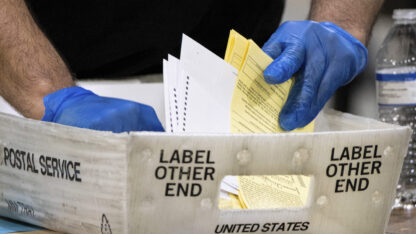There are election reforms that both Democrats and Republicans seem to like

Earlier this year, Senate Majority Leader Chuck Schumer, D-N.Y., called a targeted effort by some senators to reform the election certification process that former President Donald Trump attempted to hijack on Jan. 6, 2021, “unacceptably insufficient and even offensive.”
Schumer wanted to go bigger.
He wanted to focus on much more expansive voting rights legislation, known as the Freedom to Vote Act, which would have overhauled essentially everything about the American election system: when and where Americans could cast a ballot, how they contribute to political campaigns, and how states draw their political lines.
The proposal was trimmed down from an even larger elections bill, but it was still so massive that many election experts and even some Democrats privately say they never actually expected it to pass.
Then it failed.
Democrats in Congress haven’t made it clear what they might pursue next, but experts see at least two paths towards a more piecemeal approach to putting in some guardrails around elections in the U.S.
Electoral Count Act reform is seen as necessary, but criticized as insufficient
The option gaining momentum recently is an update to the aforementioned rules around presidential election certification, known as the Electoral Count Act.
The law has been derided as poorly written and vague for decades, and its lack of clarity led to the attack on the U.S. Capitol on Jan. 6, 2021, when Trump supporters falsely believed Vice President Mike Pence had more power over the certification of Electoral College votes submitted by the states than he actually did.
A bipartisan group of senators has been meeting to discuss potential revisions to the law, and there are indications that Schumer’s opposition to it may be softening since the larger Democratic effort on voting rights failed.
Rick Hasen, an election law expert at the University of California-Irvine, said that he feels the voting reforms in the Freedom to Vote Act are necessary, too, but Congress would be right to prioritize the ECA to prevent subversion of the results of a presidential election.
“As much as one might be concerned about voter suppression — and I’ve written two books on the subject, I’m very concerned about it — I put the concern about election subversion even higher,” Hasen said. “If you don’t have a system where votes are fairly counted, you don’t have a democracy at all.”
According to Politico, there are seven Democrats and nine Republicans in the bipartisan group that has begun meeting and discussing an update to the ECA.
One proposal tries to answer voting concerns of Democratic and Republican voters
The level of bipartisan engagement on the ECA never coalesced around the other voting rights reforms Democrats had hoped would come from this Congress, which have grown more urgent as some states across the country passed laws last year restricting voting access.
Republicans have often said they have no interest in federalizing the nuts and bolts of election infrastructure, so mandating things like automatic voter registration or no-excuse absentee voting was a nonstarter.
But Matthew Weil thinks there is another way.
Weil leads the elections project at the Bipartisan Policy Center, which recently released a report detailing what it sees as an “achievable” set of reforms for Congress to focus on.
“Both parties have prioritized elections to their voters,” said Weil. “Democrats have been spending a lot of time talking about voter suppression and voters from the Republican Party are hearing that our election system is completely insecure.”
BPC’s proposal would address both concerns, Weil says, meaning there’s a way for politicians to sell it to their voters — no matter their affiliation.
Importantly, the BPC report does not argue for federal mandates, but instead argues for an incentivization structure where federal funding would be tied to whether states meet minimum accessibility and security standards such as:
- Seven days of in-person early voting
- No-excuse absentee voting with secure ballot tracking and multiple return options
- Audits after each federal election
- Minimum cybersecurity standards and training
Nine states that range across the political spectrum either currently already meet all of the report’s minimum standards or meet all but one. Both Colorado and Georgia meet all of the proposed minimum standards for instance, even though Colorado is a vote-by-mail state and Georgia leans more heavily on in-person voting.
Because of the incentive structure, the proposal also might be an easier sell to Republicans like Ohio Secretary of State Frank LaRose, who worry about federal overreach. LaRose staunchly opposed the Freedom to Vote Act, calling it a power grab on the part of Democrats.
But in an interview with NPR recently, LaRose said he had read the BPC report and that he could see supporting similar legislation. Ohio already complies with more than 80% of the report’s standards.
Weil, of the BPC, sees parallels to 2002 when Congress passed a bipartisan set of election reforms in the shadow of the 2000 presidential election, one of the closest and most contentious in modern history.
“Both parties had incentives to do something about the elections process,” Weil said. “I think I see some of those same possibilities now.”
9(MDAxODM0MDY4MDEyMTY4NDA3MzI3YjkzMw004))







